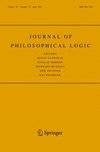非质点证据的超元逻辑
IF 0.7
1区 哲学
0 PHILOSOPHY
引用次数: 0
摘要
我们提出了一种证据逻辑,通过将经典命题逻辑与表观模态范围内公式的子结构模态逻辑相结合,减少了代理人的表观理想化。为此,我们提供了证据的邻域语义,它为相关命题逻辑提供了 Fine 语义的模态扩展。然后,通过将可能世界集定义为 Fine 语义中信息状态的一个特殊子集,得到了经典命题逻辑的可能世界语义。最后,我们证明了证据在我们的逻辑中是一个超引伸和非质数概念,并为我们的证据逻辑提供了一个健全而完整的公理化。本文章由计算机程序翻译,如有差异,请以英文原文为准。
A Hyperintensional Logic of Non-prime Evidence
We present a logic of evidence that reduces agents’ epistemic idealisations by combining classical propositional logic with substructural modal logic for formulas in the scope of epistemic modalities. To this aim, we provide a neighborhood semantics of evidence, which provides a modal extension of Fine’s semantics for relevant propositional logic. Possible worlds semantics for classical propositional logic is then obtained by defining the set of possible worlds as a special subset of information states in Fine’s semantics. Finally, we prove that evidence is a hyperintensional and non-prime notion in our logic, and provide a sound and complete axiomatisation of our evidence logic.
求助全文
通过发布文献求助,成功后即可免费获取论文全文。
去求助
来源期刊

JOURNAL OF PHILOSOPHICAL LOGIC
PHILOSOPHY-
CiteScore
2.50
自引率
20.00%
发文量
43
期刊介绍:
The Journal of Philosophical Logic aims to provide a forum for work at the crossroads of philosophy and logic, old and new, with contributions ranging from conceptual to technical. Accordingly, the Journal invites papers in all of the traditional areas of philosophical logic, including but not limited to: various versions of modal, temporal, epistemic, and deontic logic; constructive logics; relevance and other sub-classical logics; many-valued logics; logics of conditionals; quantum logic; decision theory, inductive logic, logics of belief change, and formal epistemology; defeasible and nonmonotonic logics; formal philosophy of language; vagueness; and theories of truth and validity. In addition to publishing papers on philosophical logic in this familiar sense of the term, the Journal also invites papers on extensions of logic to new areas of application, and on the philosophical issues to which these give rise. The Journal places a special emphasis on the applications of philosophical logic in other disciplines, not only in mathematics and the natural sciences but also, for example, in computer science, artificial intelligence, cognitive science, linguistics, jurisprudence, and the social sciences, such as economics, sociology, and political science.
 求助内容:
求助内容: 应助结果提醒方式:
应助结果提醒方式:


